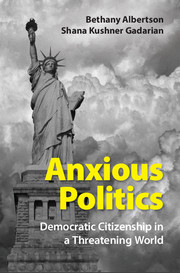Description
Anxious Politics
Democratic Citizenship in a Threatening World
Authors: Albertson Bethany, Gadarian Shana Kushner
Anxious Politics argues that political anxiety affects the news we consume, who we trust, and what public policies we support.
Language: English
Approximative price 92.80 €
In Print (Delivery period: 14 days).
Add to cart
Anxious Politics
Publication date: 08-2015
264 p. · 15.6x23.5 cm · Hardback
Publication date: 08-2015
264 p. · 15.6x23.5 cm · Hardback
Approximative price 31.58 €
In Print (Delivery period: 14 days).
Add to cart
Anxious Politics
Publication date: 09-2015
268 p. · 15.2x23 cm · Paperback
Publication date: 09-2015
268 p. · 15.2x23 cm · Paperback
Description
/li>Contents
/li>Biography
/li>
Emotions matter in politics - enthusiastic supporters return politicians to office, angry citizens march in the streets, a fearful public demands protection from the government. Anxious Politics explores the emotional life of politics, with particular emphasis on how political anxieties affect public life. When the world is scary, when politics is passionate, when the citizenry is anxious, does this politics resemble politics under more serene conditions? If politicians use threatening appeals to persuade citizens, how does the public respond? Anxious Politics argues that political anxiety triggers engagement in politics in ways that are potentially both promising and damaging for democracy. Using four substantive policy areas (public health, immigration, terrorism, and climate change), the book seeks to demonstrate that anxiety affects how we consume political news, who we trust, and what politics we support. Anxiety about politics triggers coping strategies in the political world, where these strategies are often shaped by partisan agendas.
1. Anxiety in public life; 2. What's your worry? Finding and creating anxiety in the American public; 3. Anxiety, immigration, and the search for information; 4. Don't worry, be trusting? The effect of anxiety on political trust; 5. The politics of anxiety: anxiety's role on public opinion; 6. Anxiety and democratic citizenship.
Bethany Albertson is an Assistant Professor of Government at the University of Texas, Austin. She received a PhD in Political Science from the University of Chicago. Previously, she was a visiting scholar at the Center for the Study of Democratic Politics at Princeton and on faculty at the University of Washington, Seattle. Her research has been funded by the National Science Foundation and the Harrington Foundation. Her work has been published in the American Journal of Political Science, Political Behavior, Political Psychology and American Politics Research.
Shana Kushner Gadarian is an Assistant Professor of Political Science at the Maxwell School of Citizenship and Public Affairs, Syracuse University. She received a PhD in Politics from Princeton University. Previously, she was a Robert Wood Johnson Scholar in Health Policy Research at the University of California, Berkeley. Her research has been funded by the National Science Foundation, Robert Wood Johnson Foundation, Campbell Public Affairs Institute, and the Bobst Center for Peace and Justice. Her work has been published in the American Journal of Political Science, the Journal of Politics, Political Psychology, Political Communication, Perspectives on Politics, and volumes on experimental methods and political psychology.
Shana Kushner Gadarian is an Assistant Professor of Political Science at the Maxwell School of Citizenship and Public Affairs, Syracuse University. She received a PhD in Politics from Princeton University. Previously, she was a Robert Wood Johnson Scholar in Health Policy Research at the University of California, Berkeley. Her research has been funded by the National Science Foundation, Robert Wood Johnson Foundation, Campbell Public Affairs Institute, and the Bobst Center for Peace and Justice. Her work has been published in the American Journal of Political Science, the Journal of Politics, Political Psychology, Political Communication, Perspectives on Politics, and volumes on experimental methods and political psychology.
© 2024 LAVOISIER S.A.S.
These books may interest you

The Language of Politics 52.74 €



